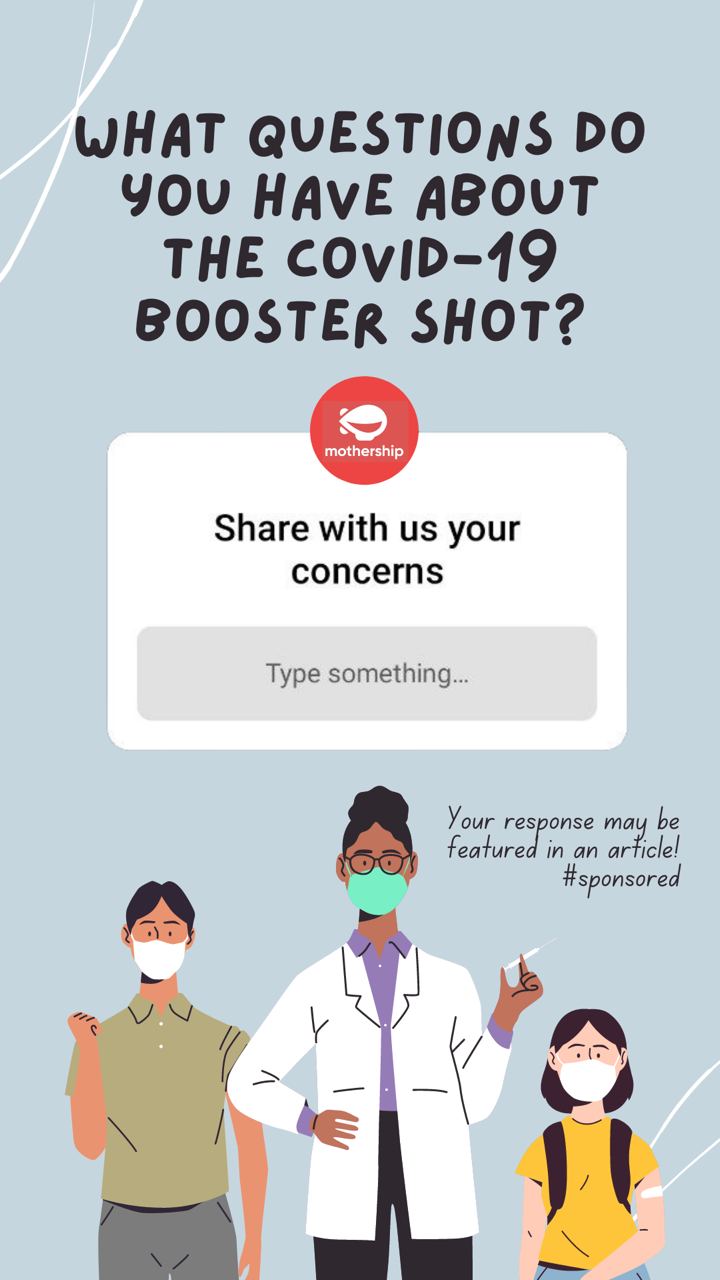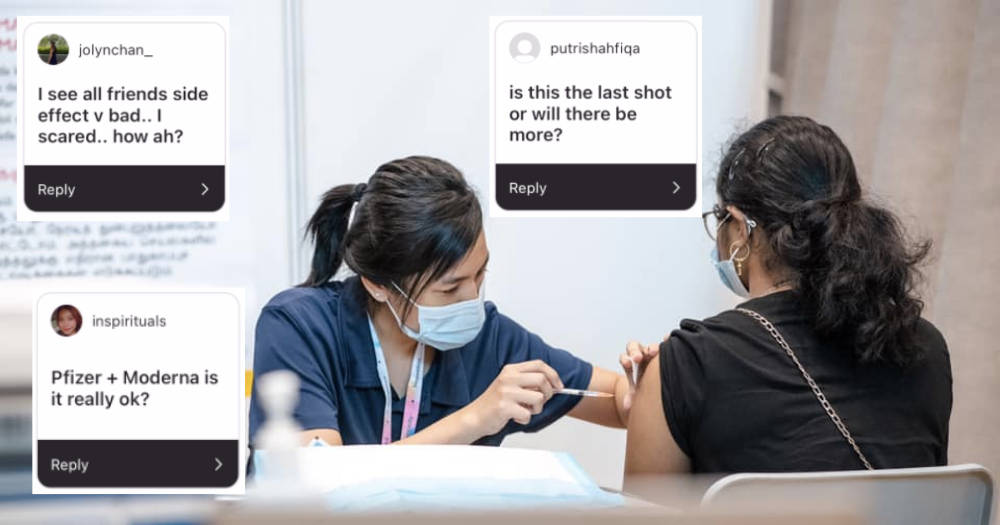Singapore is facing yet another wave of Covid-19 infection, which has been worrisome for some.
Currently, about 30 per cent of the population has yet to take their booster shot for Covid-19.
And if you’re unsure about doing so, who is better to clarify your concerns with than an expert?
Earlier this year, we asked some of you on Instagram to share your concerns about the booster shot with us.

Here are the answers to some of your burning questions about taking the third vaccine dose from Ren Ee Chee, Principal Investigator at Singapore Immunology Network, A*STAR and an Associate Professor in the Department of Microbiology & Immunology, National University of Singapore.
1. Why do we still need a booster shot after the first two doses?
Vaccines train our body’s immune system to be prepared, so that we can be protected against the real virus if infection does occur.
For someone who has not been exposed to Covid-19 before, the first vaccine jab stimulates only a weak-moderate immunity against the virus. The second jab improves the immunity to a moderate-strong level.
Immunity levels have shown to drop with time, and the booster shot will strengthen immunity even further to a strong-very strong level, which will be better at protecting the person against infection and severe illness.
2. Is the booster shot effective against the Omicron variant?
The booster shot is currently the best available course of action we can take to protect ourselves against Omicron.
When we looked at the international data, we saw that the protection from the primary vaccination series waned typically around five to six months. But with boosters, the level of protection against infection and severe illness from Omicron was restored.
Some companies have reported that they are looking into Omicron-specific vaccines, but even if such a variant-specific vaccine is manufactured, it will take some time before it is widely available.
The currently available booster shot is sufficiently effective against Omicron.
3. Will my booster shot expire and should I take it later?
Although you have up to around nine months to take the booster, you are strongly advised to take it as soon as you are eligible to give yourself that extra protection, especially in light of Omicron being more transmissible, as well as waning protection from the primary series.
4. Is this the last Covid-19 jab or would we have to keep taking regular booster shots in the future?
We will have to watch how the Covid-19 virus mutates and evolves before deciding on the need for additional jabs. It may be that we will require regular shots, similar to how we manage the seasonal flu.
In the meantime, it’s important that we continue to observe the Safe Management Measures (SMMs) and exercise social responsibility. These good practices, coupled with vaccination and the availability of anti-viral drugs, can help us reduce the spread.
5. Will I experience new side effects with the booster jab?
The type of side effects (if any) after booster dose are the same as those after the first or second dose.
For mRNA vaccines, keeping with the same or using a different brand of mRNA vaccine, it is highly unlikely to encounter new side effects.
6. Are the side effects from the booster jab going to be worse?
In Singapore, we have administered more than two million doses of booster shots. The general observation is that side effects from the booster are either the same or less serious compared to the earlier doses. So, you should not be too worried.
These include pain or redness at the injection site; fever and chills; muscle and joint pain; tiredness; and swelling of the lymph nodes. These are common side effects, similar to other vaccines, and you usually get better within a few days.
Severe allergic reactions are very rare, which may present with a combination of symptoms of difficulty breathing; swelling of the face, throat, eyes or lips; a fast heartbeat; dizziness and weakness; a bad rash all over the body. If you experience a severe allergic reaction, please seek medical attention immediately – call 995 or go to the nearest A&E.
Compared to getting a Covid-19 infection, the benefits of the booster dose definitely outweigh these side effects.
7. Do recovered Covid-19 individuals need to take booster shots? What if they had self-tested ART+?
If you are fully vaccinated and have recovered from a Covid-19 infection, you are still encouraged to take the booster dose for adequate protection against the virus. It is safe for recovered individuals to receive a booster dose, and you can do so at a vaccination centre.
If you had tested positive via a self-administered ART, or a Rostered Routine Testing, or Pre-Event Testing, there would be no medical record of your infection. You should receive your booster dose to extend the validity period of your fully vaccinated status.
However, if you would like to take a supervised ART to have your status updated in MOH’s records, you can make an appointment to do so at one of the test centres.
Even so, you are still encouraged to get a booster dose to give yourself sufficient protection. It is safe for those who have recovered from Covid-19 to receive a booster dose.
8. Will the booster shot affect my menstrual cycle and should I take it while I’m on my period?
There is no concrete, consistent evidence that booster shots affect menstrual cycles or period.
9. Is the booster shot safe for pregnant women and at what stage/month should I take it?
Yes, it is safe. Pregnant women can take their booster at any trimester and should take it as soon as possible once they are eligible. A number of clinical studies have shown that Covid-19 vaccination, including the booster shot, is safe for women during pregnancy, or even when planning to start a family.
If an unvaccinated woman contracts Covid-19 during pregnancy, she is more likely to develop a severe Covid-19 infection, which may put both her and her foetus at risk. The new-born baby could also contract Covid-19 from the mother.
Therefore, we strongly encourage pregnant women to get vaccinated and boosted as soon as possible.
10. Is it really okay to mix vaccines and is it better to do so?
There are two aspects to consider when mixing vaccines: safety and efficacy.
Safety: In Singapore, there is a range of vaccines available that were recommended by a MOH expert committee. This range of vaccines includes mRNA vaccines, inactivated virus vaccines and those in the WHO Emergency Use Listing (EUL).
Within this range, several combinations of vaccine brands have been tested internationally and locally, and there do not appear to be adverse effects.
Efficacy: Some studies do show that using Moderna as booster induces higher antibody levels. For those who have had inactivated vaccines as primary series, e.g. Sinovac or Sinopharm, mixing mRNA vaccine as their booster provides a significant enhancement of antibody levels.
For those who had received mRNA vaccine as primary series, either brand of the mRNA vaccines can be used for the booster vaccination.
More information about booster shots can be found on MOH’s website.
This article is sponsored by MOH.
Top image via MOE.
If you like what you read, follow us on Facebook, Instagram, Twitter and Telegram to get the latest updates.
